


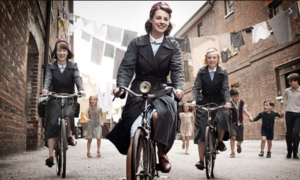
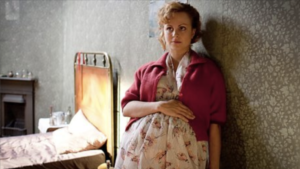
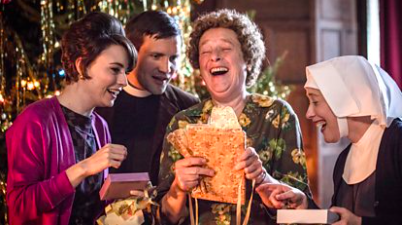
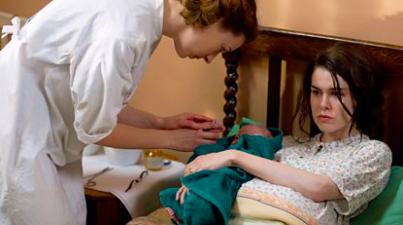
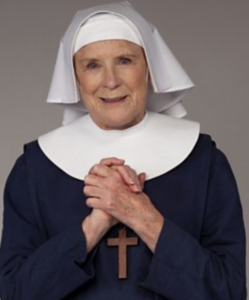
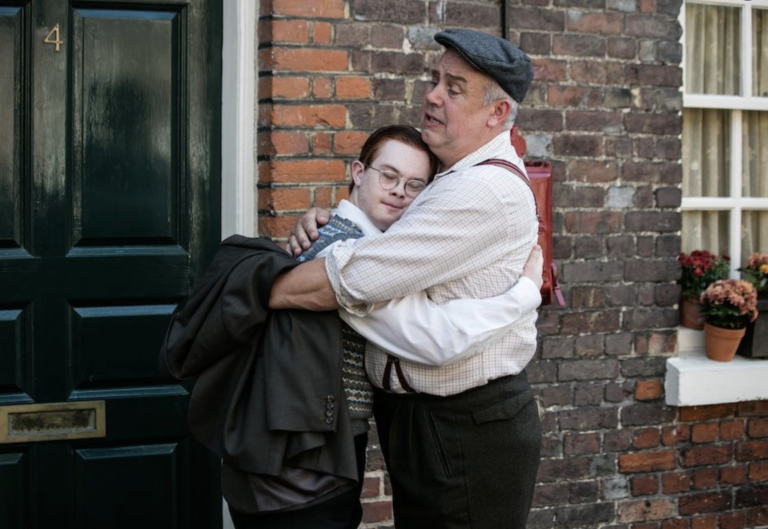
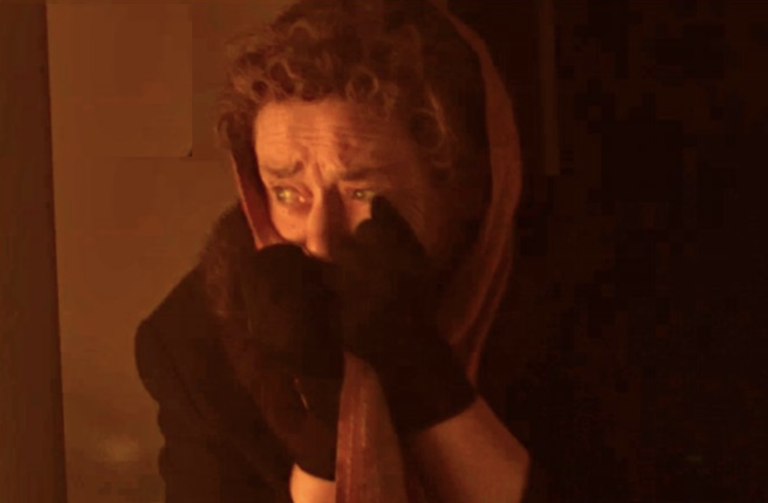
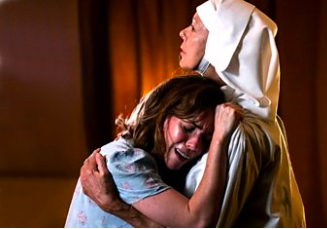
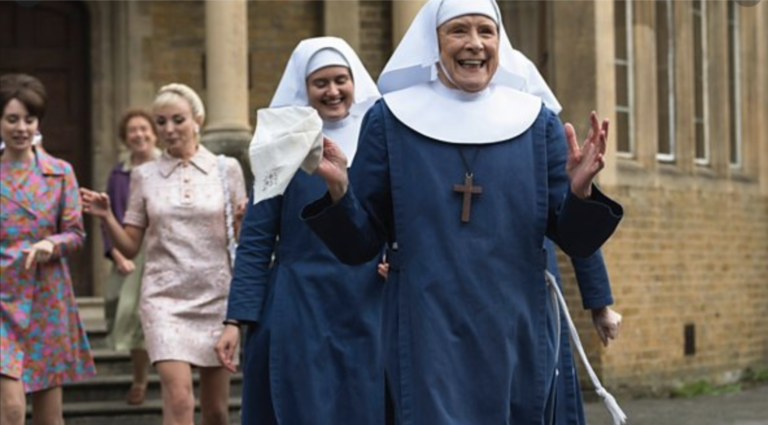
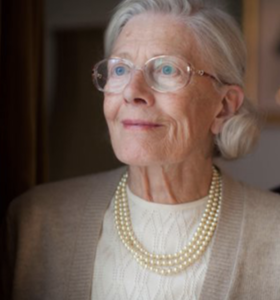
Letter from the Director, by Renée Tillotson
I am certain of nothing but the holiness of the heart’s affections and the truth of imagination.
– John Keats
Have you ever had a story creep up from behind and wrap you up in its arms? Have its characters nestled themselves into your very center, so that they tug on your heart strings when they hurt, and make you feel like dancing when they make breakthroughs, and swell your chest up with pride when they do exceedingly courageous deeds?
Nearly every evening for the last several months, my husband Cliff and I have been transported to a lower working class neighborhood in London’s East End, called Poplar. It almost feels as though we’ve physically landed sixty years back and across the world, amongst people we’ve come to love. Actually, they are arriving virtually in our home via our TV set. Yep, I’m writing to you about a television show. It’s the BBC’s fabulous Call the Midwife.
As human beings we CRAVE stories.
I believe the human psyche draws us to a good story like iron filings to a magnet, leaving beautiful arcing patterns of connection. A satisfying story makes good karmic sense that we cannot always perceive in the complexity of everyday life. Without justice, life seems purposeless. A well told story hints at the underlying justice of life. It captures a scattered array of events to reveal their meaning.
I don’t need a happy ending, I simply need a just ending that fits the causes set in motion over the course of the story. Call the Midwife accomplishes this feat every episode. We go through an emotional wringer each time we watch it, and we always come through it feeling our faith in humanity elevated, even after the saddest episode.
Gripped by every scene, Cliff and I watch a remarkably resilient and resolute band of nuns, midwives, a handy man, a constable, a curate (pastor), and a doctor all bravely serving their community. The squalor and wretchedness the nurses face in some families’ homes would scare away most professionals after their first house call. Yet these nurses continue to soldier through on behalf of their patients, defying all odds. Their efforts extend out – like a beacon’s rays of light – from a nunnery called Nonnatus House, where nursing nuns and secular nurses all reside, providing midwife services to their neighborhood.
Through the show runs a bubbling current of good humor, love, friendship and joy. It runs irrepressibly throughout the storyline, knitting together lives, making the unbearable moments not only bearable, but also times to be treasured. Every celebration arises out of a genuine sense of connection.
“Now and then in life, love catches you unawares, illuminating the dark corners of your mind, and filling them with radiance. Once in a while you are faced with a beauty and a joy that takes your soul, all unprepared, by assault.”
― Jennifer Worth, Call the Midwife: A Memoir of Birth, Joy, and Hard Times
Time after time, we watch midwives deliver babies who otherwise would might never arrive safely. We feel the gravitas of their task, bringing fragile lives into the world. Some of the would-be-mothers are frightened of medical care, think they don’t want their babies, are too young or too old for the birth to go smoothly, or are worried that their baby will come out not looking like the supposed father… and in every case, the midwife makes the baby’s entry better than it would have been without her. She calms the mother’s fears, gives excellent coaching and encouragement, and genuinely shines with delight while handing each new infant into its mother’s arms, sometimes coaxing out the woman’s own love for her child, other times rejoicing in her happiness.
The midwives take their responsibility with the seriousness it deserves. The midwives take their responsibility with the seriousness it deserves. In one episode, a midwife bicycles trough a storm, over a snowy field to a shabby trailer home to deliver the baby of a young woman who is sure her new boyfriend will never accept a child whom he did not father. In fact, the boyfriend provides the mother and midwife with essential help to deliver the baby… alas, stillborn. The midwife immediately does everything she can to revive the infant, to no avail. The mother is inconsolable. Giving her deepest condolences, the midwife says she will take care of the tiny body, packing it tenderly into her leather nursing bag. Just as she is closing the bag, the boyfriend tucks in a small hot water bottle, saying he can’t send a baby out into the cold without it.
The nurse sadly rides back through the storm and is just about to the door of Nonnatus House when she detects a muffled cry. Sure enough, the “stillborn” child in her bag is alive, thanks to the hot water bottle, followed by the nurse’s quick care with the other midwives at Nonnatus House. Although thoroughly exhausted by this whole ordeal, the delivering midwife takes the baby back through the bitter cold to his overjoyed mother and ‘father’, who has thoroughly earned the title by now.
By the next morning the midwife is a wreck. The somewhat senile, yet uncannily insightful Sister Monica Jones comes upon the distraught younger midwife, seething with self-doubt. How, she demands of herself, could she possibly have missed the signs that this newborn was alive? She had performed CPR on him. What on earth had she done wrong? The scene is one of the many instances in which the characters care for one another with wise tenderness. The elder nurse counsels the younger one not to doubt herself, that mysterious things happen in life, and that “sometimes we find God’s hands at the ends of our own arms.” The next time we see the young midwife, she’s successfully delivering babies again.
The world is full of love that goes unspoken. It doesn’t mean that it is felt less deeply… its beauty and its pain are in its silence.
– an epilogue from Call the Midwife
Like all truly great stories, Call the Midwife lets us see the frailties and imperfections of its characters as they struggle with difficult situations, allowing us to more clearly perceive their strengths as they shine through. We experience our own humanity a little more deeply, perhaps from a perspective we have not seen or felt before.
The people of Nonnatus House go far above and beyond their official duties. Fred Buckle, the ebullient maintenance man, keeps the nuns’ bicycles in service, their garden in bloom, and the Poplar community entertained with children’s plays and a fashion show in which he hilariously shows up in drag. He is the one to warmly greet a young family of five from Ireland on the day they drive into town to become the new owners of Poplar’s tobacco and news shop. Tragically, the father dies in a car accident before even entering their new home, leaving his very pregnant wife and two children stranded in a foreign land. The Anglican English tend to despise the Catholic Irish. Not the Nonnatus House residents! They offer both their sympathies and their help to the young widow. She proudly refuses, saying they will get by on their own, thank you.
In no short order she finds herself in need of a midwife’s assistance. Midwife Barbara, herself the wife of the neighborhood’s Anglican curate, cheerfully arrives to deliver – surprise – two babies to the already beleaguered mother. The next evening Barbara comes by to check in on the family, only to find the tobacco shop in flames below the family’s apartment. A second, middle-aged midwife, Nurse Crane, appears on the scene, sends Barbara for help, then goes through the burning tobacco shop up to the family’s flat. Nurse Crane manages to wrap the mother, two children and twin babies in blankets and wet scarves, then safely escorts them out through the flames, nearly getting trapped inside herself as she pulls up the rear. Nonnatus House gives shelter to the family.
What to do now? The family hadn’t been able to afford insurance for the building, and they are nearly penniless. Nonnatus House to the rescue! Fred Buckle steps up, bringing with him a whole brigade of village volunteers who completely gut and renovate the damaged shop for the young widow, who will now be able to earn a livelihood for her family.
At the center of all the workings of Nonnatus are the wise, compassionate ministrations of the head nun, Sister Julienne. She guides her brood with a deft, sure hand, always sensitive to each individual’s needs and frailties, giving comfort to her patients and appreciating the tremendous nursing skills of her midwives. While providing strong leadership, Sister Julianne also listens to differing opinions, allowing, for example, one of the midwives to teach a women’s dance exercise class, scantily clad in leotard and tights (Oh my!) She counsels and protects the women under her care, makes corrections as they may need them, and quietly celebrates their many successes.
In an excellently crafted and enacted story, we come to see the characters self-surpass, to grow in their bravery or compassion or insight. We may also witness another character’s downfall, and come to understand how, at a deep level, they are the very ones who bring the walls crashing down upon themselves.
We really have no idea how utterly essential good leadership is to Nonnatus House – and to the Poplar neighborhood itself – until Sister Julianne is displaced. With no warning, a stern, dour nun from the Mother House suddenly takes over Sister Julianne’s position. Cold and nearly heartless, this new head nun cuts off every small pleasure, giving away their television and reducing their meals to Spartan fare. The nuns and midwives put up with this deprivation, but their misery starts when she begins restricting their ability to care for their patients, cutting their home care visits to a mere 20 minutes and forbidding any care outside their strict duties.
What has always been a merry band of nurses supporting each other through the thick and thin of medical service in a poor community, now becomes a harried, stressed group of women under the emotional whip of this new authoritarian head nun. The light of the Nonnatus House dims to a meager flame. As viewers, we can hardly bear to watch the stifling of this life-giving force.
Only when a tiny baby dies – who otherwise would have survived if the attending nurse had been allowed time to properly care for him and the mother – does this draconian nun relinquish her position, recognizing the damage she has done. Sister Julianne returns to her rightful role, and Nonnatus House regains its stature as a place of hope and good cheer to all.
That episode impressed upon us what a bodhisattvic mission these women embody, and how crucial wise, compassionate leadership is to all triumphs over great misery and misfortune. Nonnatus House shines like the proverbial “city on a hill” – shedding benevolent heart light through a sometimes grim setting, touching its beloved people with grace and warmth.
That episode impressed upon us what a bodhisattvic mission these women embody, and how crucial wise, compassionate leadership is to all triumphs over great misery and misfortune. Nonnatus House shines like the proverbial “city on a hill” – shedding benevolent heart light through a sometimes grim setting, touching its beloved people with grace and warmth.
Is Nonnatus House real? Call the Midwife was originally based on the memoirs of an actual midwife who served in London’s East End in the late 1950s. Her character, Jenny Lee, plays in the first few seasons of the show. The scripts for the subsequent seasons arise out of historically documented events and medical developments in that time and place, moving through the early 1960s. The voice of the elderly Jenny Lee – played by the incomparable Vanessa Redgrave – narrates an eloquent, insightful prologue and epilogue to every episode, providing a golden frame around each poignant vignette. You can read one of her epilogues in A Word to the Wise below.
So is this show real or not? To the extent that its characters, their aspirations, their valiant struggles and their achievements live in our minds and hearts, they provide a vision of a golden age society towards which we can set our sights. What could be more real and meaningful to our collective evolution?
Imagination is one of the most potent faculties, for it enables us to reach nearer to realities. – Appollonius
A Word to the Wise
The wise will always learn.
The generous will always find they have more to give.
Thus, we cross the threshold into freedom, Into progress, into embracing all that’s new.
The world shifts around us, and we shape ourselves to fit.
Imperfect and beautiful, wounded and thriving, delicate, invincible, forever moving on.
Time is not the tide.
It moves in only one direction.
Go forth with courage and in hope.
Change is not loss.
We must run with it, dance with it, give it all we have.
Closing lines read by Vanessa Redgrave, Season 9 Call the Midwife, Episode 5
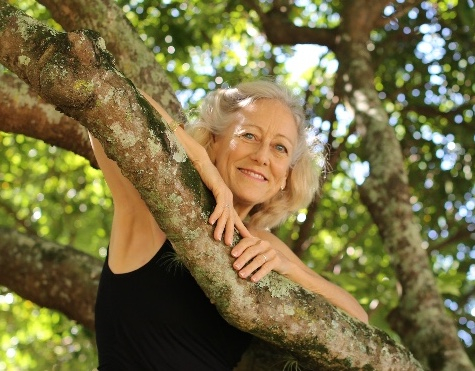
Renée Tillotson
Renée Tillotson, Director, founded Still & Moving Center to share mindful movement arts from around the globe. Her inspiration comes from the Joy and moving meditation she experiences in the practice of Nia, and from the lifelong learning she’s gained at the Institute of World Culture in Santa Barbara, California. Engaged in a life-long spiritual quest, Renée assembles the Still & Moving Center Almanac each year, filled with inspirational quotes by everyone from the Dalai Lama to Dolly Parton. Still & Moving Center aspires to serve the community, support the Earth and its creatures, and always be filled with laughter and friendship!

Get the Still & Moving App
This post is also available in: 日本語 (Japanese)

